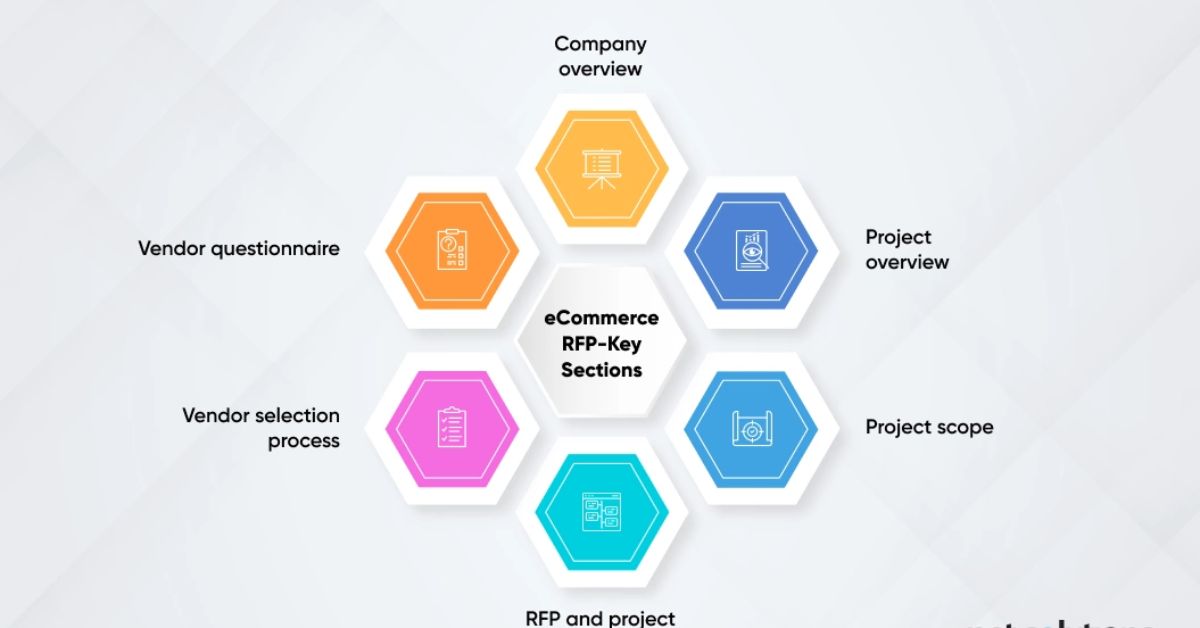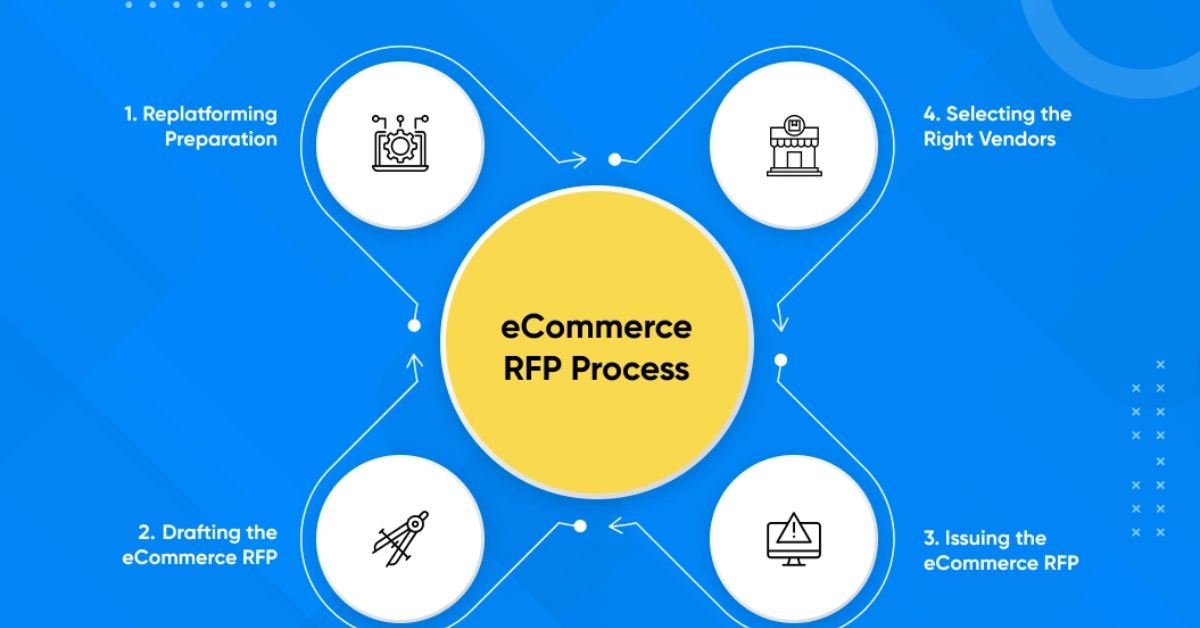A good eCommerce website is essential for any retail business that sells things online. Cutting-edge technology can assist you in standing out, increasing conversions, and improving the customer experience in order to generate loyalty and assure long-term success.
A well-written Request for Proposal (RFP) may help you ask the appropriate questions and select the ideal outsourcing partner for your eCommerce project, whether you’re trying to establish a brand new eCommerce website or hoping to expand an existing site’s functionality.
This blog post will go over everything you should include in your RFP as well as the critical steps to preparing an RFP that will help you reach your business goals.
What Should Be Included in an eCommerce RFP?
Clear and logical RFP structure will assist potential vendors in understanding your company demands and whether their services and competencies match your eCommerce requirements.
Every RFP should contain the following six key elements:
- Company Overview
- Project Overview
- Project Scope
- RFP Project Timeline
- Vendor Selection Process & Criteria
- Questions for the Vendor
Now we’ll go through each item in depth so you can design an RFP that will help you acquire bids from the right suppliers and build the optimal eCommerce solution for your company.
Company Overview
Explain what your company does and your target audiences, and identify the main stakeholders in your organization who are involved in this project.
Things to include in your company profile:
- Company background
- Target market
- Problems you solve for those who purchase your products
- Company leadership and stakeholders
Project Overview
A comprehensive, easy-to-understand project outline can assist potential vendors in understanding what you aim to achieve with your eCommerce project. Understanding your company’s goals and deliverables can assist them in determining proper pricing.
What do you need for your eCommerce project? Are you developing a whole new e-commerce platform? Are you re-platforming an existing site that is based on a SaaS eCommerce platform (for example, a Shopify site or a custom-built site) to make it a custom site?
Which eCommerce functionalities are you looking for? Do you require the development of new payment gateways? Do you need to make changes to enhance a poor client experience? Integration of APIs?
These are some optimization approaches that you could adopt. Including whatever you have identified as critical to your eCommerce project is critical.
Things to include in your project overview:
- Overall project goals
- Features and functionality you’re hoping to achieve
- User personas if you have them handy
- Risks that could potentially affect the outcome of your project
- Marketplaces you serve (or intend to serve)
- The eCommerce SaaS platform you’re currently using (if applicable) and whether you want to change to a new eCommerce platform
- Any preferences you might have for eCommerce platforms to use as the foundation for your custom website (such as Magento)
Project scope
Potential partners must comprehend the scope of your project in order to produce a fair pricing quote and an accurate time-to-completion estimate. This is where you detail the services you require as much as feasible.
Things to include in your project scope:
- Replatforming needs
- Number of pages
- Functionality required
- Degree of customization needed
- Any requirements beyond design and development (such as project management, Quality Assurance, etc.)
- Anything else that will help software vendors understand your needs
RFP and project timeline
Based on your deliverables, potential outsourcing partners can inform you whether your timeline is reasonable.
Things to include in your project timeline:
- Launch date
- Anything that might impact your target launch date
- How flexible your launch date is (if at all)
Vendor selection process and criteria
What are your criteria for evaluating potential vendors? Are you seeking for specialized knowledge? Is price your most essential consideration? List all of your requirements so that prospective partners may demonstrate their skills and adjust their offerings to your needs.
Things to include in your vendor selection criteria:
- Top priorities (e.g., experience, budget)
- Any additional information about how you plan to prioritize different factors
Questions for the vendor
The final element of an eCommerce RFP that we recommend having is a questionnaire that digs deep to solicit responses from possible applicants interested in creating your online shop for you. The questions will include crucial topics such as:
- General information about the vendor
- Platform, design, customization, and UX experience
- IT, hosting, and security
- Architecture and integrations
- Marketing
- Product management
- B2B capabilities
- eCommerce analytics and reporting
- Checkout and payment
- Omnichannel sales and support
- Customer support
Continue reading to learn about some of the most effective questions you can ask in each category to help you discover the best vendor to develop your digital commerce store.
Step-by-Step: The eCommerce RFP Process and Timeline
Avoid the urge to just start writing when generating an RFP for eCommerce software or websites.
Meetings with key stakeholders and careful analysis of your website’s functioning and business goals are required when creating an eCommerce RFP.
The four-step method that follows will enable you to design a clear, successful RFP, extensively review responders, and pick the finest RFP responses to add to your interview shortlist.
Step 1: Prepare and plan for re-platforming
Set up meetings with key stakeholders to understand what requirements your new eCommerce website will require. Before crafting your RFP, you should consider the following during those sessions.
Key items to consider at the planning stage:
- Software requirements
- Development, design, product management, and maintenance services needed
- Your project timeline
- Budget
- Evaluation criteria, including your method for bid scoring
Step 2: Draft the eCommerce RFP
Writing, rewriting, and working out the details of your eCommerce RFP will be an iterative process in which you will collect advice from stakeholders within your organization as well as leadership.
Always keep your target audience in mind when you create your RFP. Consider the difficulties you aim to solve for them and how your platform may make their customer journey easier.
Key items to include in the RFP:
- Executive summary
- Company name and information
- Project summary
- Project scope, budget, and time frame
- Bid submission deadline
- Key questions for each vendor (see above)
Step 3: Finalize and issue your eCommerce RFP
After you’ve prepared the RFP, it’s time to choose which outsourcing teams you’d like to collaborate with. You can conduct your own research to identify a good fit, or you can use an RFP network to automatically distribute the RFP to possible providers.
Key steps to RFP finalization and distribution:
- Identify companies to solicit bids from
- Create a process for receiving and evaluating RFPs, including a scoring system
- Make a plan for answering questions from vendors
Step 4: Review vendor proposals and award the contract
After your deadline has past, use the scoring process you’ve designed to analyze the offers you got. To find your top applicants, use an Excel spreadsheet with a weighted criteria matrix.
Once you’ve narrowed down your list, it’s time to schedule interviews and ask the tough questions. Check out our ultimate outsourcing for a step-by-step guide to hiring a software development company.
Steps for reviewing RFP proposals:
- Score each proposal and select the top candidates
- Schedule interviews
- Write and sign contracts
- Let all potential vendors on your shortlist know you’ve decided.
The timeline for each of these processes will vary based on the size of your firm and the functionality of your eCommerce website.
Allow enough time to construct a thorough RFP process, as this will lay the groundwork for creating a high-quality online store.
Need a Customized eCommerce solution?
Net Solutions has been building bespoke eCommerce websites and unique eCommerce solutions for decades. We assist B2C and B2B eCommerce businesses convert visitors into paying clients and establish lasting loyalty.
We’ve worked with eCommerce behemoths like American Golf and Euro Car Parts and promising eCommerce startups. Set up a free consultation today to learn more about what we can do for your company.
Please stay connected with us on techyember.com for more articles and recent news.


